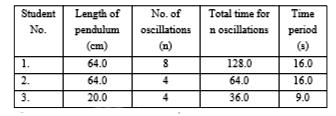A student performs an experiment an for determination of g(=4π2lT2). The error in length l is Δl and in time T is ΔTandn is number of times the reading is taken. The measurment of g is most accurate for
(a) Δl=5mm,Δ=0.2sec,n=10
(b) Δl=5mm,Δ=0.2sec,n=20
( c ) Δl=5mm,Δ=0.1sec,n=10
( d ) Δl=1mm,Δ=0.1sec,n=50
The correct Answer is:D
(d) Δgg=Δll+2ΔTT
ΔlandΔT least and number of reading are maximum in option (d), therefore the measurement of g is most accurate with data used in this option.
Topper's Solved these Questions
Similar Questions
A student performs an experiment for determination of g=4π2lT2l≈1m and the commits an error of ''Deltal' For T he takes the time of n osciilations with the stop watch of least count Δt For which of the following data the measurement of g will be most accurate ?
(a) ΔL=0.5ΔL=0.1,n=20
(B) ΔL=0.5Δt=0.1,n=50
(C) ΔL=0.5,Δt=0.02n=20 (D) ΔL=0.1Δt=0.05n=50 .
View SolutionThree students S1,S2andS3 perform an experiment for determining the acceleration due to gravity (g) using a simple pendulum. They use different lengths of pendulum and record time for different number of oscillations. The observations are as shown in the table.

(Least count of length = 0.1 m least count for time = 0.1 s)
If E1,E2andE3 are the percentage errors in 'g' for students 1, 2 and 3 respectively, then the minimum percentage error is obtained by student no._____.
View Solution
Knowledge Check
A student performs an experiment for determination of g=4π2lT2 and he commits an error of Δl. For that he takes the time of n oscillations with the stop watch of least count ΔT and the commits a human error of 0.1 sec. For which of he following data, the measurement of g will be most accurate?
AΔl→5mm,ΔT→0.2sec,n→10,Ampli.Ofoscill.→5mmBΔl→5mm,ΔT=0.2,n→10,Ampli of oscill. →5mmCΔl→5mm,ΔT→0.1sec,n→20,Ampli. Of oscill. →1mmDΔl→1mm,ΔT→0.1sec,n=20,Ampli of oscill. →1mmAs student performs an experiment for determine of g[=4π2LT2].L≈1m, and has commits an error of ΔL for T he tajes the teime of n osciollations wityh the stop watch of least count ΔT. For which of the following data the measurement of g will be most accurate?
AΔL=0.5,ΔT=0.1,n=20BΔL=0.5,ΔT=0.1,n=50CΔL=0.5,ΔT=0.01,n=20DΔL=0.5,ΔT=0.05,n=50As student performs an experiment for determine of g[=4π2LT2].L≈1m, and has commits an error of ΔL for T he tajes the teime of n osciollations wityh the stop watch of least count ΔT. For which of the following data the measurement of g will be most accurate?
AΔL=0.5,ΔT=0.1n=20BΔL=0.5,ΔT=0.1n=50CΔL=0.5,ΔT=0.01n=20DΔL=0.5,ΔT=0.05n=50
The percentage error in measurements of length and time period is 2% and 1% respectively . The percentage error in measurements of 'g' is
View SolutionThe percentage error in determination fo g=4π2It2, when I and t are measured with ±1% and ±2% errors is
View SolutionTo estimate g (from g=4π2LT2), error in measurement of L is ±2% and error in measurement of Tis±3% The error in estimated g will be
View SolutionA student performs an experiment to determine the acceleration due to gravity g. The student throws a steel ball up with initial velocity u and measures the height h travelled by it at different times t. The graph the student should plot on a graph paper to readily obtain the value of g is
View SolutionA student measures the value of g with the help of a simple pendulum using the formula g=4π2LT2. He measures length L with a meter scale having least count 1 mm and finds it 98.0 cm . The time period is measured with the help of a watch of least count 0.1s . The time of 20 oscillations is found to be 40.4 s. The error Δg in the measurment of g is ( inm/s2).
View Solution
